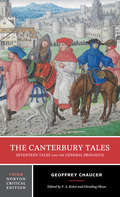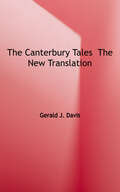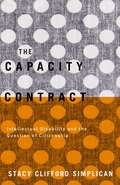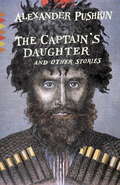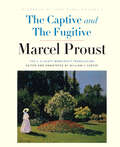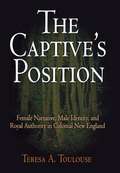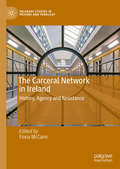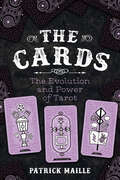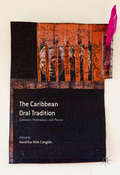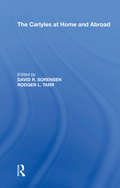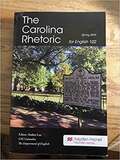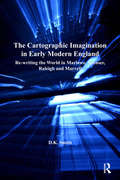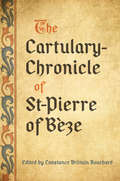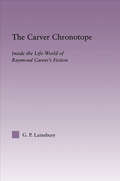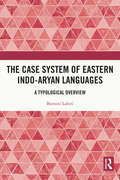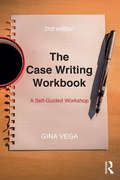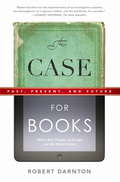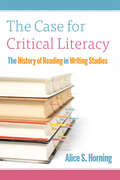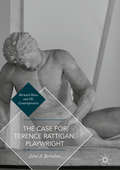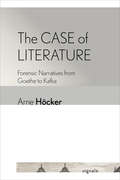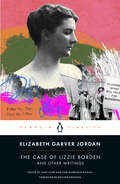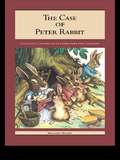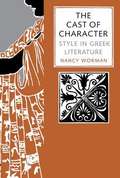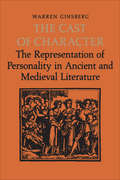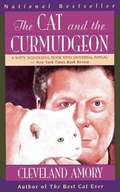- Table View
- List View
The Canterbury Tales: Seventeen Tales And The General Prologue (Norton Critical Editions #0)
by Geoffrey Chaucer V. A. Kolve Glending Olson“This book has been more helpful to the students—both the better ones and the lesser ones—than any other book I have ever used in any of my classes in my more than a quarter century of university teaching.” —RICHARD L. KIRKWOOD, University of Wisconsin–Eau Claire This Norton Critical Edition includes: • The medieval masterpiece’s most popular tales, including—new to the Third Edition—The Man of Law’s Prologue and Tale and The Second Nun’s Prologue and Tale. • Extensive marginal glosses, explanatory footnotes, a preface, and a guide to Chaucer’s language by V. A. Kolve and Glending Olson. • Sources and analogues arranged by tale. • Twelve critical essays, seven of them new to the Third Edition. • A Chronology, a Short Glossary, and a Selected Bibliography. About the Series Read by more than 12 million students over fifty-five years, Norton Critical Editions set the standard for apparatus that is right for undergraduate readers. The three-part format—annotated text, contexts, and criticism—helps students to better understand, analyze, and appreciate the literature, while opening a wide range of teaching possibilities for instructors. Whether in print or in digital format, Norton Critical Editions provide all the resources students need.
The Canterbury Tales: The New Translation (Enriched Classics)
by Geoffrey ChaucerThe classic collection of beloved tales, both sacred and profane, of travelers in medieval England.
The Capacity Contract: Intellectual Disability and the Question of Citizenship
by Stacy Clifford SimplicanIn the first sustained examination of disability through the lens of political theory, The Capacity Contract shows how the exclusion of disabled people has shaped democratic politics. Stacy Clifford Simplican demonstrates how disability buttresses systems of domination based on race, sex, and gender. She exposes how democratic theory and politics have long blocked from political citizenship anyone whose cognitive capacity falls below a threshold level⎯marginalization with real-world repercussions on the implementation of disability rights today. Simplican&’s compelling ethnographic analysis of the self-advocacy movement describes the obstacles it faces. From the outside, the movement must confront stiff budget cuts and dwindling memberships; internally, self-advocates must find ways to demand political standing without reinforcing entrenched stigma against people with profound cognitive disabilities. And yet Simplican&’s investigation also offers democratic theorists and disability activists a more emancipatory vision of democracy as it relates to disability⎯one that focuses on enabling people to engage in public and spontaneous action to disrupt exclusion and stigma. Taking seriously democratic promises of equality and inclusion, The Capacity Contract rejects conceptions of political citizenship that privilege cognitive capacity and, instead, centers such citizenship on action that is accessible to all people.
The Captain's Daughter: And Other Stories
by Alexander Pushkin Robert Chandler Elizabeth ChandlerFamous for his enormously influential poetry and plays, Alexander Pushkin is also beloved for his short stories. This collection showcases his tremendous range, which enabled him to portray the Russian people through romance, drama, and satire. The sparkling humor of the five "Tales of Belkin" contrasts with a dark fable of gambling and obsessive greed in "The Queen of Spades" and the masterful historical novella, "The Captain's Daughter," a story of love and betrayal set during a rebellion in the time of Catherine the Great.
The Captive and The Fugitive: In Search of Lost Time, Volume 5 (Modern Library Classics Ser. #5)
by Marcel ProustAn authoritative new edition of Marcel Proust’s The Captive and The Fugitive, published together as the fifth volume of his epic masterwork, In Search of Lost Time Marcel Proust’s monumental seven-part novel In Search of Lost Time is considered by many to be the greatest novel of the twentieth century. The Captive and The Fugitive, the fifth and sixth volumes of Proust’s masterpiece, contain some of literature’s most beautiful meditations on art, music, desire, jealousy, love and loss, grieving and forgetting. In this work, Proust continues his vast satirical fresco of high society in France just prior to the outbreak of World War I. These volumes and the following volume were published posthumously, as Proust died when he was approximately one-third of the way through correcting the proofs for The Captive.The Fugitive was also the last volume translated by Charles Kenneth Scott Moncrieff, who did not live to finish his enormous task. This edition of the two, published together as the fifth volume, is edited and annotated by noted Proust scholar William C. Carter, who endeavors to bring the classic C. K. Scott Moncrieff translation closer to the spirit and style of the original.
The Captive's Position
by Teresa A. ToulouseWhy do narratives of Indian captivity emerge in New England between 1682 and 1707 and why are these texts, so centrally concerned with women's experience, supported and even written by a powerful group of Puritan ministers? In The Captive's Position, Teresa Toulouse argues for a new interpretation of the captivity narrative--one that takes into account the profound shifts in political and social authority and legitimacy that occurred in New England at the end of the seventeenth century.While North American narratives of Indian captivity had been written before this period by French priests and other European adventurers, those stories had focused largely on Catholic conversions and martyrdoms or male strategies for survival among the Indians. In contrast, the New England texts represented a colonial Protestant woman who was separated brutally from her family but who demonstrated qualities of religious acceptance, humility, and obedience until she was eventually returned to her own community. Toulouse explores how the female captive's position came to resonate so powerfully for traditional male elites in the second and third generation of the Massachusetts colony. Threatened by ongoing wars with Indians and French as well as by a range of royal English interventions in New England political and cultural life, figures such as Increase Mather, Cotton Mather, and John Williams perceived themselves to be equally challenged by religious and social conflicts within New England. By responding to and employing popular representations of female captivity, they were enabled to express their ambivalence toward the world of their fathers and toward imperial expansion and thereby to negotiate their own complicated sense of personal and cultural identity.Examining the captivity narratives of Mary Rowlandson, Hannah Dustan, Hannah Swarton, and John Williams (who comes to stand in for the female captive), Toulouse asserts the need to read these gendered texts as cultural products that variably engage, shape, and confound colonial attitudes toward both Europe and the local scene in Massachusetts. In doing so, The Captive's Position offers a new story of the rise and breakdown of orthodox Puritan captivities and a meditation on the relationship between dreams of authority and historical change.
The Carceral Network in Ireland: History, Agency and Resistance (Palgrave Studies in Prisons and Penology)
by Fiona McCannThis book examines the forms and practices of Irish confinement from the 19th century to present-day to explore the social and political failings of 20th and 21st century postcolonial Ireland. Building on an interdisciplinary conference held in the Crumlin Road Gaol, Belfast, the methodological approaches adopted across this book range from the historical and archival to the sociological, political, and literary. This edited collection touches on topics such as industrial schools, Magdalen laundries, struggles and resistance in prisons both North and South, Direct Provision, and the ways in which prison experiences have been represented in literature, cinema, and the arts. It sketches out an uncomfortable picture of the techniques for policing bodies deployed in Ireland for over a century. This innovative study seeks to establish a link between Ireland’s inhumane treatment of women and children, of prisoners, and of asylum seekers today, and to expose and pinpoint modes of resistance to these situations.
The Cards: The Evolution and Power of Tarot
by Patrick MailleTarot cards have been around since the Renaissance and have become increasingly popular in recent years, often due to their prevalence in popular culture. While Tarot means many different things to many different people, the cards somehow strike universal chords that can resonate through popular culture in the contexts of art, television, movies, even comic books. The symbolism within the cards, and the cards as symbols themselves, make Tarot an excellent device for the media of popular culture in numerous ways. They make horror movies scarier. They make paintings more provocative. They provide illustrative structure to comics and can establish the traits of television characters. The Cards: The Evolution and Power of Tarot begins with an extensive review of the history of Tarot from its roots as a game to its supposed connection to ancient Egyptian magic, through its place in secret societies, and to its current use in meditation and psychology. This section ends with an examination of the people who make up today’s tarot community. Then, specific areas of popular culture—art, television, movies, and comics—are each given a chapter in which to survey the use of Tarot. In this section, author Patrick Maille analyzes such works as Deadpool, Books of Magic by Neil Gaiman, Disney's Haunted Mansion, Sherlock Holmes: Game of Shadows, The Andy Griffith Show, Buffy the Vampire Slayer, and King of the Hill. The cards are evocative images in their own right, but the mystical fascination they inspire makes them a fantastic tool to be used in our favorite shows and stories.
The Caribbean Oral Tradition: Literature, Performance, and Practice
by Hanétha Vété-CongoloThe book uses an innovative prism of interorality that powerfully reevaluates Caribbean orality and innovatively casts light on its overlooked and fundamental epistemological contribution into the formation of Caribbean philosophy. It defines the innovative prism of interorality as the systematic transposition of previously composed storytales into new and distinct tales. The book offers a powerful consideration of the interconnections between Caribbean orality and Caribbean philosophy, especially as this pertains to aesthetics and ethics. This is a new area of thought, a new methodological approach and a new conceptual paradigm and proposition to scholars, students, writers, artists and intellectuals who conceive and examine intellectual and cultural productions in the Black Atlantic world and beyond.
The Carlyles at Home and Abroad: Essays In Honour Of Kenneth J. Fielding
by Rodger L. TarrThe Carlyles at Home and Abroad explores the extensive influence of Thomas Carlyle and Jane Welsh Carlyle in England and Scotland, Europe, and the United States. The contributors explore a wide range of topics, such as aesthetics, history, biography, literature, travel writing, feminism and race. The result is a volume that offers a fresh assessment of the couple as national and international figures.
The Carolina Rhetoric For English 102
by USC Columbia The Department of EnglishThe Carolina Rhetoric for English 102
The Cartographic Imagination in Early Modern England: Re-writing the World in Marlowe, Spenser, Raleigh and Marvell
by D.K. SmithWorking from a cultural studies perspective, author D. K. Smith here examines a broad range of medieval and Renaissance maps and literary texts to explore the effects of geography on Tudor-Stuart cultural perceptions. He argues that the literary representation of cartographically-related material from the late fifteenth to the early seventeenth century demonstrates a new strain, not just of geographical understanding, but of cartographic manipulation, which he terms, "the cartographic imagination." Rather than considering the effects of maps themselves on early modern epistemologies, Smith considers the effects of the activity of mapping-the new techniques, the new expectations of accuracy and precision which developed in the sixteenth century-on the ways people thought and wrote. Looking at works by Spenser, Marlowe, Raleigh, and Marvell among other authors, he analyzes how the growing ability to represent physical space accurately brought with it not just a wealth of new maps, but a new array of rhetorical techniques, metaphors, and associations which allowed the manipulation of texts and ideas in ways never before possible.
The Cartulary-Chronicle of St-Pierre of Béze (Medieval Academy Books)
In the early twelfth century a Burgundian monk set out to tell the 500-year history of his monastery, embedded within a broader history of early medieval France. The Cartulary-Chronicle of St.-Pierre of Bèze is both a history of the monastery and a collection of its 331 charters, from its seventh-century foundation until the middle of the twelfth century. Bèze was a Benedictine house whose history included at least six incidents of sacking and destruction – and according to its twelfth-century chronicler it always recovered and emerged stronger than ever. Combining the history of Burgundy and Francia with the history of his house, John, the chronicler, created a past for Bèze as he wanted it to be remembered. Based on John’s autograph manuscript, The Cartulary-Chronicle of St.-Pierre of Bèze is published here in full for the first time. While the monks of Bèze have often been overshadowed by their more famous neighbors, the monks of Dijon, this edition recounts the history of one of the oldest houses in Burgundy and gives it its proper due.
The Carver Chronotope: Contextualizing Raymond Carver (Studies in Major Literary Authors #Vol. 23)
by G.P. LainsburyRaymond Carver's fiction is widely known for its careful documentation of lower-middle-class North America in the 1970s and 80s. Building upon the realist understanding of Carver's work, Raymond Carver's Chronotope uses a central concept of Bakhtin's novelistics to formulate a new context for understanding the celebrated author's minimalist fiction. G. P. Lainsbury describes the critical reception of Carver's work and stakes out his own intellectual and imaginative territory by arguing that Carver's fiction can be understood as diffuse, fragmentary, and randomly ordered. Offering a fresh analysis of Carver's body of work, this book offers an extensive meditation on this major figure in postmodern U.S. fiction.
The Case System of Eastern Indo-Aryan Languages: A Typological Overview
by Bornini LahiriThis book presents a typological overview of the case system of Eastern Indo-Aryan (EIA) languages. It utilizes a cognitive framework to analyse and compare the case markers of seven EIA languages: Angika, Asamiya, Bhojpuri, Bangla, Magahi, Maithili and Odia. The book introduces semantic maps, which have hitherto not been used for Indian languages, to plot the scope of different case markers and facilitate cross-linguistic comparison of these languages. It also offers a detailed questionnaire specially designed for fieldwork and data collection which will be extremely useful to researchers involved in the study of case. A unique look into the linguistic traditions of South Asia, the book will be indispensable to academicians, researchers, and students of language studies, linguistics, literature, cognitive science, psychology, language technologies and South Asian studies. It will also be useful for linguists, typologists, grammarians and those interested in the study of Indian languages.
The Case Writing Workbook: A Self-Guided Workshop
by Gina VegaThis book offers a modular set of chapters that focus specifically on the challenges related to case writing. Exercises, worksheets, and training activities help guide readers sequentially through the entire process of writing both a case and an instructor’s manual (teaching note). Designed as an individualized workshop to assist case authors to structure their writing, this book combines the easy-to-understand, student-focused language of the first edition with new material covering the latest developments and challenges in the world of case writing. These include: ? A section on writing cases in condensed time frames ? A new module on writing short cases in various formats ? A new module on turning research papers into teaching tools ? A section about growing communities of practice in a university ? An expansion of the student case writing module to include a section on case writing for graduate students ? Twelve new worksheets ? A complete index to facilitate use of the book Finishing all the book’s assignments will result in a complete case and instructor’s manual that can be tested in the classroom and submitted to a conference or journal. The Case Writing Workbook is a must for the shelf of any academic or student conducting qualitative research and looking to enhance their skill set.
The Case for Books: Past, Present, and Future
by Robert DarntonThe era of the printed book is at a crossroad. E-readers are flooding the market, books are available to read on cell phones, and companies such as Google, Amazon, and Apple are competing to command near monopolistic positions as sellers and dispensers of digital information. Already, more books have been scanned and digitized than were housed in the great library in Alexandria. Is the printed book resilient enough to survive the digital revolution, or will it become obsolete? In this lasting collection of essays, Robert Darnton?an intellectual pioneer in the field of this history of the book?lends unique authority to the life, role, and legacy of the book in society.
The Case for Critical Literacy: A History of Reading in Writing Studies
by Alice S. HorningThe Case for Critical Literacy explores the history of reading within writing studies and lays the foundation for understanding the impact of this critical, yet often untaught, skill. Every measure of students’ reading comprehension, whether digital or analog, demonstrates that between 50 and 80 percent of students are unable to capture the substance of a full discussion or evaluate material for authority, accuracy, currency, relevancy, appropriateness, and bias. This book examines how college-level instruction reached this point and provides pedagogical strategies that writing instructors and teachers can use to address the problem. Alice Horning makes the case for the importance of critical reading in the teaching of writing with intentionality and imagination, while sharing glimpses of her own personal history with reading and writing. Horning provides the context for understanding what college faculty face in their classrooms and offers a history of critical literacy that explains why, to date, it has mostly neglected or ignored the diverse statuses of students’ reading challenges. The Case for Critical Literacy explores actionable options to better meet students’ literacy needs. College and university faculty, especially writing instructors, will benefit from an understanding of what has happened in the field and what needs to change.
The Case for Terence Rattigan, Playwright
by John A. BertoliniThis book asserts the extraordinary quality of mid-twentieth century playwright Terence Rattigan's dramatic art and its basis in his use of subtext, implication, and understatement. By discussing every play in chronological order, the book also articulates the trajectory of Rattigan's darkening vision of the human potential for happiness from his earlier comedies through his final plays in which death appears as a longed for peace. New here is the exploration through close analysis of Rattigan's style of writing dialogue and speeches, and how that style expresses Rattigan's sense of life. Likewise, the book newly examines how Rattigan draws on sources in Greek and Roman history, literature, and myth, as well as how he invites comparison with the work of other playwrights, especially Bernard Shaw and Shakespeare. It will appeal broadly to college and university students studying dramatic literature, but also and especially to actors and directors, and the play-going, play-reading public.
The Case of Literature: Forensic Narratives from Goethe to Kafka (Signale: Modern German Letters, Cultures, and Thought)
by Arne HöckerIn The Case of Literature, Arne Höcker offers a radical reassessment of the modern European literary canon. His reinterpretations of Goethe, Schiller, Büchner, Döblin, Musil, and Kafka show how literary and scientific narratives have determined each other over the past three centuries, and he argues that modern literature not only contributed to the development of the human sciences but also established itself as the privileged medium for a modern style of case-based reasoning.The Case of Literature deftly traces the role of narrative fiction in relation to the scientific knowledge of the individual from eighteenth-century psychology and pedagogy to nineteenth-century sexology and criminology to twentieth-century psychoanalysis. Höcker demonstrates how modern authors consciously engaged casuistic forms of writing to arrive at new understandings of literary discourse that correspond to major historical transformations in the function of fiction. He argues for the centrality of literature to changes in the conceptions of psychological knowledge production around 1800; legal responsibility and institutionalized forms of decision-making throughout the nineteenth century; and literature's own realist demands in the early twentieth century.
The Case of Lizzie Borden and Other Writings: Tales of a Newspaper Woman
by Elizabeth Garver JordanThe first and only comprehensive collection of writings by Elizabeth Garver Jordan, the groundbreaking journalist, suffragist, and editor whose fearless reporting on women preceded the #MeToo movement and popularized the true-crime genreA Penguin ClassicThe Case of Lizzie Borden and Other Writings is the first to collect Garver Jordan&’s fiction and journalism, much of which has been out of print for over a century. Jordan began her career as a reporter, making her name as one of few women journalists to cover the Lizzie Borden murder trial for the New York World in 1893. Jordan&’s distinctive, narrative-driven coverage of the Borden and other high-profile murder cases brought her national visibility, and she turned increasingly to fiction writing. Drawing on her experiences as a true-crime reporter and newspaper editor, she published detective novels and short story collections such as Tales of the City Room that explored the fine line between women&’s criminality and crimes against women. Employing popular genre conventions as a means of dealing with women&’s issues, Jordan exposed gendered abuse in the workplace and the prevalence of sexual violence. The Case of Lizzie Borden and Other Writings encourages readers to draw a historical trajectory from Jordan&’s pioneering literary activism to the writings of contemporary journalists and novelists whose work continues to fuel discussions of gender, feminism, and crime, raising questions about who gets to tell women&’s stories, especially in the wake of the #MeToo movement.
The Case of Peter Rabbit: Changing Conditions of Literature for Children (Children's Literature and Culture #7)
by Margaret MackeyFirst published in 1998. Routledge is an imprint of Taylor & Francis, an informa company.
The Cast of Character: Style in Greek Literature
by Nancy WormanShe demonstrates that, as liars and imitators, pleasing storytellers, and adept users of costume, these two figures are especially skillful manipulators of style. In tracing the way literary representations of them changed through time—from Homer's positive portrayal of their subtle self-presentations to the sharply polarized portrayals of these same subtleties in classical tragedy and oratory—Worman also uncovers a nascent awareness among the Greek writers that style may be used not only to persuade but also to distract and deceive.
The Cast of Character: The Representation of Personality in Ancient and Medieval Literature
by Warren GinsbergThis book is concerned with the idea of character and the methods of representing it in ancient and medieval narrative fiction, and shows how late classical and medieval authors adopted techniques and perspectives from rhetoric, philosophy, and sometimes theology to fashion figures who define not only themselves but also their readers. Ginsberg first tests Ovid's concept in the Amores and the Metamorphoses against the conventions of classical tradition and shows how, although Ovid's idea of character did not change, his technique grew more subtle and complex as his art matured. Ginsberg then employs the methods of biblical exegesis to show how medieval characters – Gottfried's Tristan, Dante's Farinata, Chrétien's Yvain – both exist as themselves and point to characters beyond themselves, gaining depth and resonance because we see them in this perspective. Perspective is also a distinguishing quality of the maturing of Boccaccio's art. In the early works his characters seem to be little more than positions in a debate, but as he grew more skilful the strict formalism of binary oppositions gave way to the complexity of experience characteristic of the 'probably true' and culminating in the hundred perspectives of the Decameron. In Chaucer's Canterbury Tales the pilgrims are both typical and individual, twice-formed by the tale and by the frame. A character acts, and the reader forms expectations of his acting and in the process 'character,' the abiding glory of medieval literature, is created.
The Cat and the Curmudgeon
by Cleveland AmoryThe Runaway Sequel to the Runaway Bestseller about the Runaway Cat Famous fabulist and curmudgeon humorist Cleveland Amory has done it again. In this best-selling sequel to The Cat Who Came for Christmas, Amory and feisty feline Polar Bear continue their wonderful true adventures. Despite his hard-knock beginnings, Polar Bear is finicky about his newfound fame. Will he overcome his aversion to the paparazzi? Will nine lives be long enough for him to answer all his fan mail? Will Cleveland's story of Nancy Reagan's family furniture finally lure Polar Bear from beneath the bed? This tale of two curmudgeons will tickle the fancy of everyone who has ever been owned by a cat.
